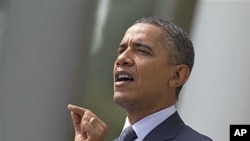Presenting his second major set of economic proposals in 10 days, President Barack Obama has unveiled a plan for more than $3 trillion in spending reductions over the next decade, saying all Americans, and specifically the wealthy, will be asked to share the burden of fixing the economy. Republicans already are criticizing the proposals.
In battles with Congress over deficit and debt reduction and taxes, Obama has always stressed the need for balance in fixing the nation's fiscal mess, and shared sacrifice while not harming the most vulnerable Americans.
Coming after his $447-billion jobs proposal, his recommendations to a joint congressional deficit reduction panel raise the stakes again in the political wrestling match with opposition Republicans.
Combo of cuts, taxes
The plan contains more than $3.2 trillion in deficit savings over the next decade, combining spending cuts with new tax revenue - including a new minimum tax on millionaires.
With the earlier $1 trillion in cuts from a difficult compromise with Republicans, this makes for $4.4 trillion, on the level of the so-called grand bargain that Obama advocated earlier this year, but Republicans ultimately rejected.
"It is a plan that reduces our debt by more than $4 trillion, and achieves these savings in a way that is fair, by asking everybody to do their part so that no one has to bear too much of the burden on their own," said the president.
Obama's plan takes aim at tax loopholes favoring the wealthy, and assumes an expiration of tax cuts approved by Congress under former Republican President George W. Bush. It also seeks broad tax reforms.
Ending certain tax breaks
Included are steps Republicans have resisted, such as eliminating tax breaks for oil and gas companies, ending tax advantages for highly-paid Wall Street fund managers, and eliminating benefits for those who own corporate jets.
It also envisions $1.1 trillion in savings from the drawdown of U.S. troops in Iraq and Afghanistan, $250 billion in other so-called mandatory programs, reducing government waste, and streamlining federal agencies.
Obama proposes more than $300 billion in savings from Medicare and Medicaid, the so-called "entitlement" programs burdening the economy, part of more than $500 billion in cuts to mandatory programs.
The president responded to Republican and conservative Tea Party critics who have accused him of conducting "class warfare" by targeting the wealthy for tax increases.
He said he will reject anything that reduces benefits for those depending on major government health programs and Social Security, unless wealthy Americans and large companies are asked to pay more.
"I will not support any plan that puts all the burden for closing our deficit on ordinary Americans. And I will veto any bill that changes benefits for those who rely on Medicare, but does not raise serious revenues by asking the wealthiest Americans or the biggest corporations to pay their fair share," he said.
Showdown with Republicans
The White House says implementing the plan would put the United States in a position by 2017 where government spending does not add to the national debt, currently more than $14 trillion, with debt beginning to fall as a share of GDP.
Treasury Secretary Timothy Geithner said, "Why $4 trillion? That is what you need to bring the deficits down to a level that that we can sustain over time."
Under the previous deficit compromise, which Republicans linked to the national debt ceiling, the joint congressional committee must find $1.5 trillion in additional savings by November. Failure to do so would lead to automatic cuts.
The House of Representatives speaker, Republican John Boehner, accused Obama of "pitting one group of Americans against another." He said it is evident that "barriers" remain between himself and the president over tax increases and entitlement programs.
With polls showing most Americans favor more sacrifice from the wealthy, Obama wants to increase public pressure on Republicans, as the congressional committee works on its decisions, and reduce criticism from within his Democratic base.
The White House believes that by finally "drawing the line" on the need for tax increases on the wealthy, a president with low approval numbers on his handling of the economy will be able to draw an even clearer contrast with Republican positions as the 2012 election draws near.
Saying the changes he is proposing are neither easy nor politically convenient, Obama said it's the responsibility of leaders in Washington to "put country before party" in a debate he says is as much about fairness as it is about facing up to a legacy of debt that threatens the economy.














